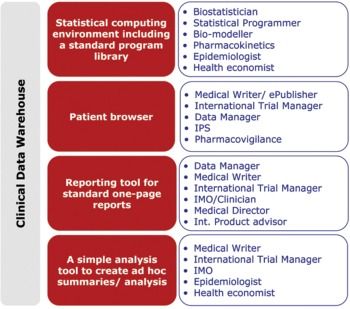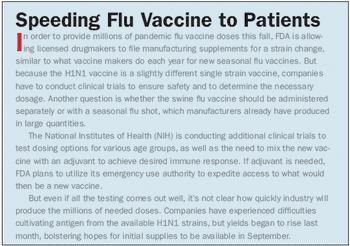
Sandoz Shire Pharmaceuticals announced that it would allow Sandoz to market a generic version of its blockbuster ADHD med Adderall XR if it can clear FDA. But that's a big if.

Sandoz Shire Pharmaceuticals announced that it would allow Sandoz to market a generic version of its blockbuster ADHD med Adderall XR if it can clear FDA. But that's a big if.



12 October

Sure, industry growth is at "historically low levels," but at least pharma is still growing. The industry's market value should surpass $825 billion in 2010, and forecasted growth was bumped up one percentage point from original estimates.

Meet Pharm Exec?s 2009 Emerging Leaders?27 industry pioneers under age 45 who are bringing new ideas to life - 09 emerging leaders

Pulling off an incredibly fast turnaround, the pharma industry has released a vaccine for the H1N1 virus, bolstering its bottom line with a second flu vaccine and potentially helping millions of people. So why is there such an uproar over whether it's safe?


An increasing pressure to get products to market means more data must be handled within a shorter time span. But how?

05 October

Governments and payers don't see that innovation covers everything from invention to building market share. Scant attention is paid to the critical "back end" of the innovation cycle.

Game-changers can create competitive advantages for pharmaceutical companies and products.

01 October 2009

Just months on the job and GSK’s new president of North American Pharmaceuticals Deirdre Connelly is already making her presence known. Her latest move-spearheading an initiative that will boost funding to autonomous CME programs and cut commercial medical education programs. Pharm Exec spoke with Connelly to find out more.

June 2009 BPA Statement

Takeda's Dr Erich Brunn tells Pharm Exec Europe why now is the right time for the Japanese giant to get really serious about Europe.

"If you don't like change, you are going to like irrelevance even less." Gen Eric Shinseki US Army (ret.)

Elan was forced to trim $100 million off its billion-dollar deal with J&J due to a 50/50 agreement with Biogen Idec involving co-ownership of MS drug Tysabri. Now J&J is out a major drug, Elan is out a good chunk of cash, and Biogen Idec is pondering its next move.

While pharma is not synchronized with the boom and bust of the general economy, lessons from the business cycle facing manufacturers can enable the pharmaceutical industry to tackle the problems it faces, writes Chris Hart of McKinney Rogers.

15 September 2009

Eli Lilly announced this morning that it would eliminate approximately 5,500 positions as part of a massive reorganization strategy that's expected to net the firm reduce $1 billion in costs by 2011.

With the pending retirement of three senior-level executives, Roche announced a new corporate executive team to bridge the personnel gap while the company looks for new leaders.

Some shareholders think they were shafted in the multi-billion dollar deal between Sepracor and Dainippon Sumitomo Pharma. They're so miffed, in fact, that they've filed a lawsuit stating that the amount offered undervalues the company and its shares.

Times are changing in the pharmaceutical and life sciences sectors and their supply chains are having to adapt to a new set of challenges, says Kenneth Porter of specialist consultancy Total Logistics.

Ravi Shankar asks how pharmaceutical firms can best organise the vast amounts of data needed to stay in compliance with issues such as physician spend management.

Physician Spend Management: How Health and Life Sciences Companies Can Simplify Compliance with Master Data Management - Siperian Whitepaper

Physician Spend Management: How Health and Life Sciences Companies Can Simplify Compliance with Master Data Management - Siperian Whitepaper

2 September 2009

Pharma steps up development of new vaccines and treatments to combat Third World diseases

Mastery of internal factors can mean the difference between thriving and failing in an environment where industry is a price taker, not a price setter.